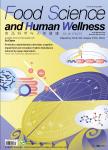Role of polyphenols in epilepsy: from the perspective of gut microbiota
作者机构:Department of Pharmaceutical Toxicology, School of Pharmacy, China Medical UniversityShenyang Department of Neurology, the First Hospital of China Medical University Department of Pharmacy, the Fourth Affiliated Hospital of China Medical University Department of Gastroenterology, the Fourth Affiliated Hospital of China Medical University Department of Obstetrics and Gynecology, Shengjing Hospital of China Medical University Key Laboratory of Structure-Based Drug Design & Discovery of Ministry of Education, School of Pharmaceutical Engineering, Shenyang Pharmaceutical University Jiangsu Province Key Laboratory of Anesthesiology, Xuzhou Medical University Department of Molecular Neurochemistry, Medical University of Lodz Department of Neurology, the Fourth Affiliated Hospital of China Medical University
出 版 物:《Food Science and Human Wellness》 (食品科学与人类健康(英文))
年 卷 期:2024年
核心收录:
学科分类:0832[工学-食品科学与工程(可授工学、农学学位)] 1002[医学-临床医学] 08[工学] 083201[工学-食品科学] 100204[医学-神经病学] 10[医学]
基 金:supported by the National Natural Science Foundation Committee of China (grant numbers 81971212 81601129) Shenyang Young and Middle-aged Technological Innovation Talent Support Program (RC210268) Liaoning Province Natural Science Foundation (2023-MS-153)
摘 要:Epilepsy is a devastating neurological condition that affects over 70 million people worldwide. Apart from idiopathic epilepsy, numerous diseases have been reported to cause secondary epilepsy. Polyphenols, ubiquitously existing in fruits and vegetables, has become a promising neuroprotective candidate against multiple neurological abnormalities due to its interplay with gut microbiome composed of the bacterial population in gastrointestinal system. This bioactive compound is also being tested for the management of epileptogenesis. However, there is still insufficient evidence from mechanistic studies to demonstrate the causal relationship between anti-epileptic effect of polyphenols and microbial alteration. In this review, we provide the brief overview of epilepsy, polyphenols and gut microbiota. We then analysis the association of polyphenols and gut microbiota particularly in the epilepsy and symptomatic seizures-induced by epilepsy-related disorders. We also discuss the possibility for the combined application with probiotics to improve the bioavailability and bioaccessibility of polyphenols for expanding its anti-epileptic function. We finally summarize the therapeutic potential of anti-seizure polyphenols through affecting gut microbiome, and propose that the anti-epileptic effect of polyphenols may be tightly relevant to intestinal bacterial flora for overcoming epilepsy and its comorbidities simultaneously. Therefore, the dietary polyphenols targeting specific bacteria may achieve the outcome of ‘one stone, two birds’.



